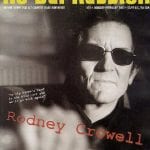Hello Stranger from Issue #31
Our most recently concluded presidential lottery is the first for which I might Constitutionally have been eligible. It is, remember, no longer required that one be a landed white male to stand for that office, but one must still have mustered the theoretical wisdom of 40 years.
Years ago I had just the arrogance and ambition to hope I might one day play in that game; something to do with a steady diet of Watergate, Martin Luther King, Trotsky, the Chicago Seven, and my older brother’s draft lottery number. Later, I came to understand that a penchant for speaking my mind disqualified me from public office, and found work as a music critic. (That leaves out a few steps, but never mind.)
Make no mistake, though, this magazine — and the music its readers listen to — is as much a political statement as was my strident opposition to the Gulf War.
Gone too far again, haven’t I?
Or not far enough.
It’s like this: Most of the decisions which impact our daily lives are not political, but they assuredly are economic. The constant, controlling power in our society is wielded not by governments but by large, multinational corporations. It is they who decide what communities will (and won’t) have jobs, what commodities will be on our shelves (or available on the internet), and what kinds of culture will be broadly disseminated.
By those terms, this magazine, and the community of writers, musicians, and entrepreneurs it serves, is very much a political statement. For we have opted to choose work, art, and values that have not been declared economically viable by the inexorable logic of the multinational corporations. By that choice we stand, albeit quietly and privately, in opposition to some very large, powerful, and seductive forces.
That stand is important. So is acknowledging that we are making such a stand.
Now, I am not a conspiracy theorist. (I did read too much science fiction as a teenager, that part is true.) I know people who do good and honorable work for large corporations, and will concede the possibility that such enterprises might themselves do good and honorable work.
No, my point here is far simpler. Who you do business with matters. Where you spend your money matters. How you conduct your own business matters. The fact that the entrepreneurial community served by this magazine is able to realize all or part of its income by operating outside that increasingly enveloping corporate world — that matters a lot.
Peter and I discovered yesterday that we have both continued to boycott Exxon, better than a decade after the Exxon Valdez went aground in Alaska, long years after we stopped seeing pictures of decimated beaches and oil-drenched waterfowl. It is a small thing, and I’m quite certain that our choice makes no difference to Exxon’s bottom line. On the other hand, that corporation behaved very badly, and I see no reason to reward that behavior by adding to their profitability, no matter how paltry my contribution might be.
I understand that this wanders rather far afield from music. I also suspect that, in large measure, I am preaching to the converted (and that the rest of you will send mail). Fair enough.
But it cuts very close to the reason much of the music we listen to gets made, and it is precisely the reason that this music is worth listening to. We have all chosen paths away from the siren calls of mainstream society.
Some obligations come with that choice. We must live and conduct our businesses honorably, lest we become smaller, meaner versions of that which we have — consciously or not — chosen to live our lives in opposition to. (I believe this is something akin to what Christians mean by bearing witness.)
You have already demonstrated a willingness to go a few extra miles by buying this magazine. Please remember that the next time you stop for gas, or buy an album, or see a performer.
Always tip your bartender.
And always mark your ballot clearly, so that the intent of your vote — and your life — may be clearly known.




